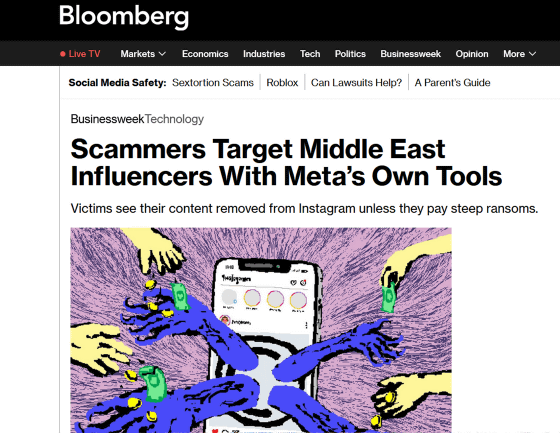Scammers exploiting Meta's copyright protection tools are threatening creators with deleting their content unless they pay a ransom

Tools designed to protect the copyrights of content posted on Facebook and Instagram are being exploited by scammers to threaten legitimate content creators with having their content removed unless they pay a ransom, according to a report by Bloomberg.
Meta Copyright Tool Is Exploited in Middle East by Extortionists - Bloomberg

In May 2023, Iraqi social media influencer Esaa Ahmed-Adnan received a message that sponsored content he posted on Instagram for a local restaurant had been flagged for 'copyright infringement' and removed. The content did not contain copyrighted music or other content, and consisted of simply touring the restaurant and sampling some of the menu items. Later, a post about a cleanup effort on the Tigris River that runs through Baghdad was also flagged for copyright infringement and removed.
When Ahmed-Adnan contacted the person who flagged him on WhatsApp, the person claimed to be the 'owner of an intellectual property protection business' and acknowledged that Ahmed-Adnan's content did not actually infringe any copyrights. However, in exchange for restoring the content, he demanded that he pay $3,000 (approximately the amount of revenue Ahmed-Adnan earns in a month). In addition, he demanded that he pay $1,000 per month or $7,000 per year if he wanted to avoid receiving false copyright infringement flags in the future.
The blackmailer sent Ahmed-Adnan screenshots of Rights Manager , a copyright protection tool from Meta, which operates Facebook and Instagram, showing that he had reported Ahmed-Adnan's content for copyright infringement. In this way, cases of scammers abusing Meta's copyright infringement tool to blackmail creators are spreading throughout the Middle East, Bloomberg reports.
Professor Smith Mehta, who studies the global creator economy at the University of Groningen in the Netherlands, said this is evidence that Meta is so eager to expand globally that it has neglected to allocate resources to policing its products in developing countries. 'Meta is just putting the platform out there and seeing how the traffic flows. Once the traffic is profitable enough, they will decide that the platform needs to be regulated and have a transparent system in place, but at the moment they don't feel that is necessary in developing countries,' he said.

For global companies such as Google and Meta, copyright infringement occurring on their platforms is a problem that could be a barrier to global expansion. Therefore, Meta has introduced Rights Manager to deal with copyright infringement, but in some countries and regions, it seems that scammers who abuse the copyright infringement reporting system are widespread.
A Meta spokesperson told Bloomberg that the company prohibits users from uploading other people's content and claiming it as their own. 'We regularly revoke access or disable accounts where we detect abuse of Rights Manager, and we're investing heavily in helping people around the world protect their rights and manage their content at scale,' the spokesperson said in an email.
Meta screens users to ensure that only legitimate rights holders can access Rights Manager, but in the Middle East, the screening is very strict, and even influencers and organizations with millions of followers can be denied access. Meanwhile, scammers are buying and selling access to the tool on the black market, and in a Facebook group found by Bloomberg, a 'Facebook or Instagram account with access to Rights Manager' was being sold for $3,000. These accounts are often hacked, and the scammers who exploit them are concentrated in the Middle East and West Asia, where it is difficult to attract Meta's attention.
Once the scammers have access to Rights Manager, they can extract video or audio files posted by the targeted influencer and upload them to their own account, which automatically sends a copyright takedown request to the original creator. The scammers can then contact the target and threaten them with a ransom if they want their content removed or restored.

Meta certifies local experts as trusted partners and has set up special channels to flag posts and accounts. One such partner, Aws al-Saadi, founder of Iraqi nonprofit Tech4Peace, said he has worked with more than 100 creators and organizations in the Middle East since May 2023 alone to address abuse of copyright infringement reports. However, dozens of creators ended up paying the ransom, and al-Saadi estimates that extortionists have made up to $1 million (about 150 million yen) from the series of scams.
Targets of extortion include hospitals, social activists, fashion models, hotels, and Iraqi cleric and politician Ammar al-Hakim . Al-Hakim had repeatedly applied for access to Rights Manager but was denied, and the scammers ended up flagging the work as copyright infringement. In this case, the scammers did not directly demand money, but instead asked for an audience with al-Hakim, but the request was rejected by the staff.
Al-Saadi raised the issue in a meeting with Meta in October, but in a subsequent meeting was told to stop prioritizing reporting copyright trolls, as it was not al-Saadi's domain. Al-Saadi said Meta showed little interest in addressing the issue or discussing it in detail. A Meta spokesperson disputed this, saying the Meta team continues to work with Tech4Peace on abuse of Rights Manager.
In addition, Ahmed-Adnan, who was mentioned at the beginning, cooperated with Tech4Peace to ask Meta to restore his content, but Meta only sent an automatic reply message refusing to restore the content. Bloomberg reported that the blackmailers continued to delete Ahmed-Adnan's content and sent provocative messages such as 'You are stupid' and 'If you do not pay within 24 hours, we will destroy your account.'
Related Posts:
in Web Service, Posted by log1h_ik







